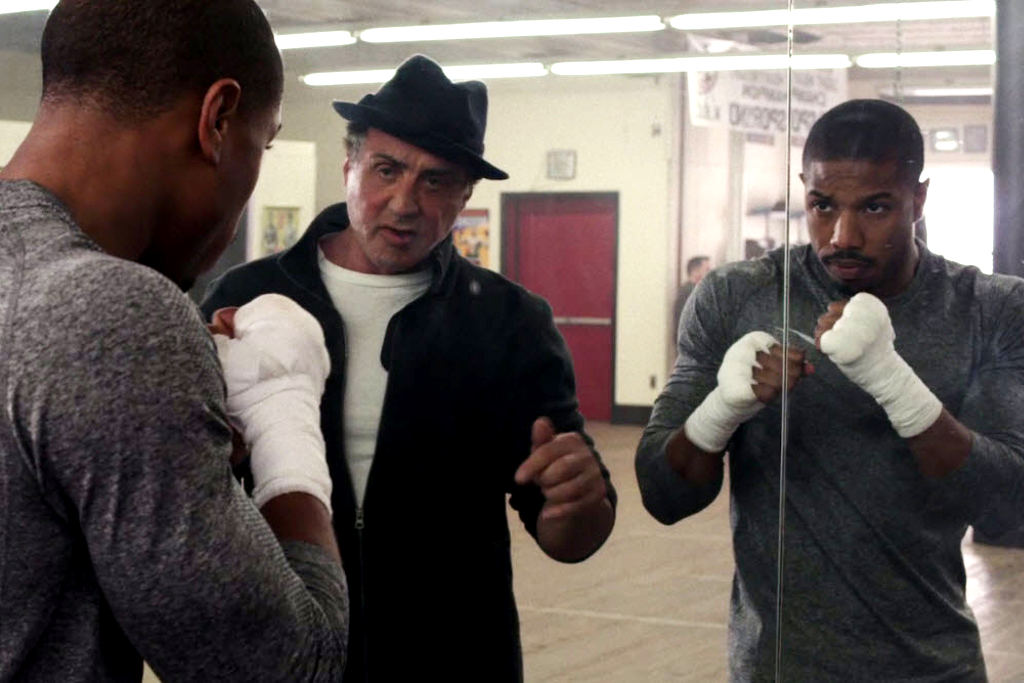Review: ‘Creed’ Is The Twilight Of The Rocky Series As We Know It, And The Beginning Of A New One
The baton passes from one outcast to another.

In the early ’80s, Dolph Lundgren was completing his masters in chemical engineering at the University of Sydney. Lundgren, only 24 and towering, was moonlighting as a bouncer. One night, he was working security at the Capitol during a Grace Jones concert. After the show, Jones handpicked Dolph to join her security detail. He fell in with her entourage, and shortly thereafter into her bed.
Lundgren chucked in the test tubes and decamped to New York, where Jones secured him a bit part in her next movie, 1985’s A View to a Kill (in which she had the no-doubt unpalatable task of canoodling with a wrinkly Roger Moore). In the same year, Lundgren appeared in Rocky IV as Ivan Drago: the most memorable heavy of the series. It was the film, and the character, that made his name.
If Jones/Lundgren was the ur-’80s couple, Drago was that decade’s most emblematic villain: a perfect physical specimen virtually engineered by the Soviets, but catwalk-ready — as if he’d been cooked up by Hitler in cahoots with Galliano. At the start of Rocky IV, Drago established his baddie bonafides by killing Carl Weathers’ Apollo Creed in the ring. Creed was Rocky’s opponent in the first two films, his trainer in the third, and his friend.
According to the newest film in the franchise, Creed had an affair, whose issue, Adonis, was born after his father’s death at the hands of Drago. Directed by Ryan Coogler (also taking over scripting duties from Stallone himself, for the first time in the history of the series), Creed economically sketches the childhood of the young Adonis: thrown into group homes after his mother dies, where he becomes a perpetual scrapper until he’s taken in by Apollo’s grieving widow. Why not just make him the legitimate son of Creed, and avoid the convoluted backstory? The new film breezily has its cake and eats it. Creed Jr. might have the name, but he’s also an outcast, determined to prove he deserves the shot that is given to him by default — just like Rocky in 1976’s original.
It’s 2015, and Adonis, or Donny – as he’s mercifully referred to for most of the film – is a financial services drone by day, a brawler in Mexico by night. Played by a winning Michael B. Jordan, the star of Coogler’s 2013 debut Fruitvale Station, Donny soon ups sticks for Philadelphia, intent on persuading his father’s old opponent to become his trainer.
The Rocky series has gone on so long and with such long gaps in between that it hardly feels of a piece — which seems to be the norm for franchises these days, from the Mad Max to Mission Impossible films. By the third, fourth and fifth movies about the Italian Stallion, the melancholy of the original, and most of the pathos, was long gone. In their place was a steroidally shredded Stallone living in a big mansion, driving fancy cars and spending his money on talking robots.
If the first film worked so perfectly because its arc aligned so satisfyingly with the story of its making – Stallone, a penniless unknown, refusing big bucks for his screenplay unless he was allowed to star in it – the later sequels confirmed that Stallone was now living off the fat of the land, an established star.
After a fifteen-year layoff, Rocky returned in 2006’s Rocky Balboa, which saw the legend, now widowed, living back in the old neighborhood, running a restaurant named after his beloved wife. In Creed, Coogler maintains most of the elements established in that film, including the newfound weariness and wisdom of the central character. Even if, in Creed, he’s no longer the central character at all.
The original Rocky was about an inarticulate, not particularly bright but very decent man who falls in love with a meek shop assistant. Their blossoming relationship saves them both. It was a film about the working class that didn’t patronise it, or make it the butt of comedy. It didn’t glamorize the street, but it didn’t go for cheap morality, either. Rocky works as a bounty hunter for a local gangster, an average guy whom Rocky never tries to distance himself from, even after he’s made it.
The newer film is slicker, more streamlined, and louder, but it retains some of the restraint that marked the original. Baton-handing can be tricky (see: Indiana Jones and the Kingdom of the Crystal Skull, The Bourne Legacy et al) but it’s something we’re going to see a lot more of – key to the studios’ mission to keep popular characters and universes in everlasting rotation. Coogler, only 29, has made a film about fathers and sons, which cleverly makes organic its commercial objective: to transfer the goodwill felt for one character onto another.
At one point, Rocky writes a list of training drills on a piece of a paper. Donny snaps a photo of it with his phone, then walks off. The old bruiser goes to give him the hard copy, but Creed tells him he doesn’t need it – “it’s in the cloud”. Rocky, confused, looks to the sky. In the next installment, I’ll bet he ascends there too. With Creed, Coogler has earned the right to swing the axe himself.
–
Creed is in cinemas now.
–